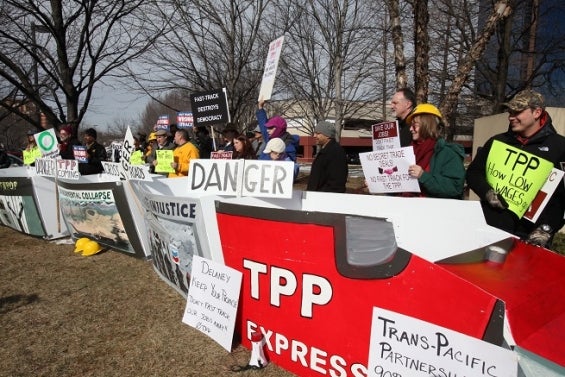Headline News
Teamsters: Ending Currency Manipulation Will Bring Worker Security

Efforts by other nations to keep the value of their currency artificially low are killing U.S. jobs and is a major reason why this country currently has an annual trade deficit in excess of $700 billion, a new Economic Policy Institute (EPI) report explains. Changing the system, the document states, would create 5.8 million jobs here.
China is the top culprit, but currency manipulation is an issue with about 20 countries worldwide. And the effects will only get worse for Americans if trade deals currently in the works, like the 12-nation Trans-Pacific Partnership (TPP), are allowed to move forward. EPI argues that millions of jobs would be created in the next three years if the practice was ended and the federal budget deficit would fall by up to $266 billion in 2015.
“Halting global currency manipulation by penalizing or offsetting currency manipulation is the best way to reduce trade deficits, create jobs, and rebuild the economy,” wrote Robert E. Scott, EPI’s director of trade and manufacturing policy research.
Sen. Sherrod Brown (D-Ohio), the lead sponsor of a legislation that would punish nations that cheat by engaging in currency manipulation, said Congress and the administration need to crack down on the practice to ensure Americans can go back to work. He added his Currency Exchange Rate Oversight Reform Act would use U.S. trade law to counter economic harms to U.S. manufacturers.
“We can create millions of jobs – without adding a dime to the deficit – by addressing currency manipulation,” Sen. Brown said. “As our trade deficit continues to widen, our need to level the playing field for American manufacturers and workers becomes more urgent.”
EPI estimates that about 40 percent of the new jobs would be in manufacturing, while nearly a half a million new agriculture-related jobs would be created. Nine of the top 10 states that would gain jobs if currency manipulation is curbed are in the Midwest. However, new jobs are likely to be created in every U.S. congressional district.
Currency manipulation is just another reason why entering new trade deals like the TPP is bad news for workers. Despite the fact that a bipartisan collection of lawmakers agree something needs to be done to fix the problem, the issue has not been addressed as part of the trade deal’s negotiations. That’s not good enough.
Hard-working Americans are weary of these trade deals because while they seem to address corporate concerns, they push those of rank-and-file workers aside. But as polls show, people are against unfair trade. They’ve seen enough lost jobs, shuttered plants and hollowed-out communities. They want more.
Addressing currency manipulation would be a significant step towards creating a plan that is fairer for U.S. workers. Making the language included in trade deals like the TPP public would be another. And allowing such agreements to be fully debated and open to amendments would ensure that democracy can reign supreme in the process.